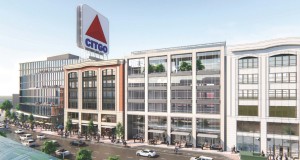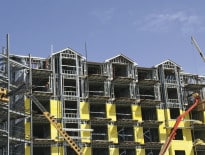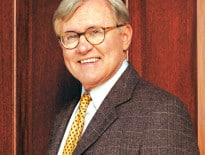From the outset, developer Related Beal envisioned its new nine-building Kenmore Square portfolio as a potential neighborhood-changing office project.
With office vacancies in the Fenway barely above 3 percent, Related Beal is so confident in future demand that it plans to break ground on the 282,500-square-foot redevelopment as soon as it obtains approvals from city regulators. Office rents in the 4.2-million-square-foot Fenway submarket have increased 77 percent since 2014, according to Colliers International Boston, with direct rents hitting $53.37 per square foot in the first quarter.
“When we studied the market and took a look at the design of the buildings, we felt office was by far the best way to go,” said Patrick Sweeney, a senior vice president at Related Beal. “With the success we’ve had with renovated office buildings at Congress Square and Lovejoy Wharf, we felt that Kenmore Square was a particularly attractive market.”
After Housing, Office and Hotel Demand Spikes
The Fenway office market is quickly evolving, the latest sign of change in a neighborhood increasingly defined by rows of luxury housing, and is being targeted by hotel developers seeking to add nearly 900 hotel rooms.
Long dominated by older class B office buildings populated by tenants connected to the Longwood Medical area, it’s attracted growing companies such as restaurant point-of-sale startup Toast, risk managers CRICO, health care tech firm Optum and WHOOP, which designs high-end fitness trackers for professional athletes.
The new arrivals value the Fenway’s MBTA Green Line connections to Jamaica Plain and Allston, where young professionals tend to live, said Michael Greeley, a managing director at Newmark Knight Frank which is marketing the Related Beal office portfolio.
“The Fenway is key to their recruitment and the identity of their companies,” Greeley said. “We don’t think there’s a cooler place to recruit young employees to in the city.”
Related Beal’s architects recommended a mix of new construction and renovations. The decision to retain 660 Beacon St., which supports the Citgo sign, reflected the complexities of keeping the rooftop beacon operational while doing a major redevelopment, Sweeney said. It will connect to a new 76,500-square-foot office building on its east side, providing the larger floor plates that tenants prefer.
And the 140,000-square-foot glass-wrapped office building at 533-541 Commonwealth Ave., which will have a series of stepped-back roof terraces in the glow of the LED landmark.
Related Beal hopes to fill at least one building with a single tenant, Sweeney said, and is considering a multitenant leasing strategy for the rest of the space.
Samuels Looks for Lab Tenants
Boston-based Samuels & Assoc. demonstrated the Fenway’s job generation potential in 2015 with its speculative Van Ness office tower that rapidly attained 100 percent occupancy. It’s counting on continued office and lab growth for its 401 Park Drive redevelopment of the Landmark Center, after previously considering multifamily housing.
Samuels is prepared to break ground on a 506,000-square-foot office and lab building on an unused corner of the property this year, if it can secure a lease for approximately 50 percent of the building, Executive Vice President Peter Sougarides said. Final construction documents are in the works.
Samuels also is marketing approximately 90,000 square feet in the main 900,000-square-foot converted warehouse building, which includes such office tenants as Boston Children’s Hospital and the aforementioned Toast.
Samuels is upgrading amenities with construction of a 1.1-acre park replacing surface parking and the scheduled 2019 opening of the second Time Out Market food hall in the U.S. Lobby renovations include replacement of the escalators with a steel-and-glass monumental staircase designed to restore the building’s 1920s architecture, Sougarides said.
Demand from big tenants – potentially out-of-state companies looking for a Hub landing spot – will bolster leasing prospects, Newmark Knight Frank Executive Managing Director David Martel predicted. As recently as a year ago, office tenants looking for a contiguous block of 100,000 square feet had 21 choices in the Boston core. The options have shrunk to eight, many in buildings several decades old.
“There’s a perception and a reality in corporate America that Boston or Cambridge is a place they have to be,” Martel said. “With what Samuels has done in the Fenway, it’s a natural place for Boston to grow and where people want to be.”
This article was updated to reflect that Related Beal’s Kenmore Square portfolio contains nine buildings, including seven that are part of the redevelopment project.




 |
| 


